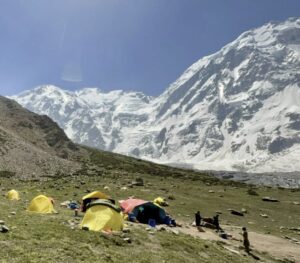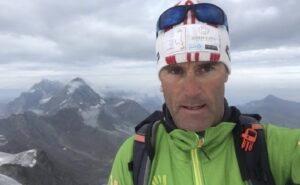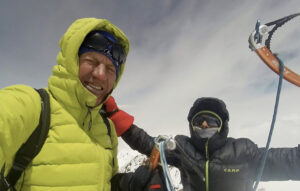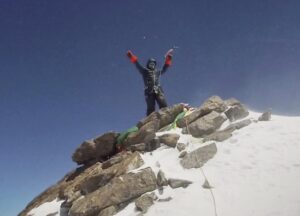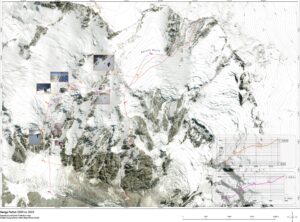A clear day has dawned on Nanga Parbat and things are looking brighter for Shehroze Kashif and Fazal Ali as they continue to descend toward Nanga Parbat Base Camp under their own power.
“People have seen them going down the technical sections below Camp 3, showing they are well and fit,” Sherohze’s father, Kashif Salman, told ExplorersWeb over the phone. In Salman’s opinion, the climbers were just tired after an unplanned bivvy and decided to remain in Camp 3 to rest, eat, and gather their energy. Today they are simply proceeding further down.
While this is great news, the context of how this fits with an ongoing rescue operation is unclear.
Choppers on their way
So, what does this mean for Gelje Sherpa and the rescue operation? Gelje Sherpa, supported by Seven Summit Treks, boarded a rescue helicopter yesterday. The chopper twice failed to approach Nanga Parbat because of zero visibility. Today, Gelje has announced that he is flying again.

Gelje Sherpa posted an Instagram story on Thursday morning.
Interestingly, Kashif Salman started the rescue appeal himself on July 6, via a video on social media. “I said that my son was stranded at 7,500m,” Salman admitted.
“They spent the [July 5] night in the open but then they came to Camp 3 by themselves. Italian climbers and others who were watching them through binoculars said they were walking normally and were clearly fit, so I presume they were just tired, spent the day in Camp 3 hydrating and gathering energy, and today they are continuing down,” Salman continued.
“Shehroze does not have any [functioning communication] device with him and he surely has no idea what is going on! He is not stranded. The helicopters may fly and may pick up my son, which will help because this way we will be able to fly back instead of driving back to Chilas, but it will not be a rescue.”
However, to most observers, this is a rescue operation, and it will be filed as such in the military aviation’s mission log. Gelje Sherpa has interrupted his current expedition to help. (He hopes to climb K2 and then Broad Peak with Adriana Brownlee.)
It is unclear who will have to foot the bill: Rescues in Pakistan are not free.

Nanga Parbat’s route, showing the high camps. Photo: Summit Karakoram
A rescue or a favor?
Asked about this, Kashif Salman said: “No, you are wrong. It is only a rescue if requested by the climbers themselves. Otherwise, like right now, it’s just a favor.”
The situation is only growing more confusing. The fact is, the climbers themselves never asked for a rescue, because they lost contact some hours after they reached the summit on July 5. But, as Gelje told media yesterday, they had spent a night in the open in bad weather, had not moved further down than Camp 3, and had a technical section below them. “We don’t know the physical condition of the climbers,” Gelje told Everest Chronicle. “This [below Camp 3] is the most difficult section, which is why rescue is necessary,” he said.
Hopefully, we will know more once the climbers get back in Base Camp, whether on foot or by air.
But first, they need to get to Base Camp. Downclimbing might prove tough, according to some highly experienced climbers currently at Nanga Parbat. Tunc Findik of Turkey tried to go up to Camp 2 yesterday with Marco Confortola, but conditions forced them down.
“We climbed to Camp 1 but there was too much rain,” said Findik. The wet snow has created a high avalanche risk on the lower ice gully. “We have decided to postpone our climb [until conditions improve],” he said.
They are currently back in BC. The ice gully that Findik mentioned is above Camp 1 and right below the rocky vertical section known as the Kinshoffer Wall. This means that Shehroze Kashif and Fazal Ali may reach Camp 2 safely, but the real difficulties could lie directly below.


